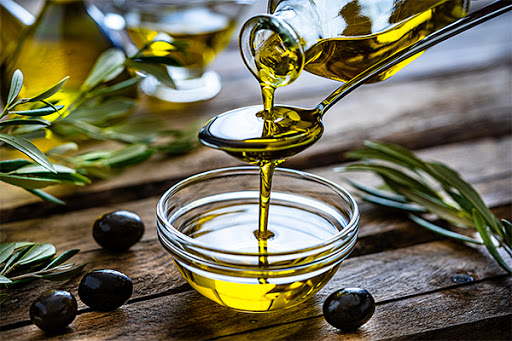Olive Oil~ A Key Component of the Mediterranean Diet
The Mediterranean dietary eating pattern centers around whole plant-based foods. It emphasizes other important aspects of a healthy lifestyle including, being social, acting mindfully, and engaging in physical activity. This diet is based on traditional foods from countries such as Greece, Italy, Spain, and others that surround the Mediterranean Sea and emphasizes consuming fruits, vegetables, whole grains, nuts and seeds, legumes, and healthy fats (like olive oil and fatty fish) along with some dairy. Meat can be part of this diet, but it is viewed more as a side dish, not a meal centerpiece. Herbs and spices are a mainstay to boost flavor. U.S. News & World Report once again rated this dietary pattern a top pick for the best diet for healthy eating. In fact, it was voted the best diet overall for 2021! In previous years it shared the number one spot with the DASH diet.
Olive oil, a monounsaturated fat, is part of the “healthy” fat group and an essential Mediterranean diet component. Many of the health benefits are associated with the polyphenols and oleic acid in the oil. Extra virgin olive oil contains the most beneficial components. In some observational studies, olive oil consumption has been linked to a lower risk of cancer, particularly breast, prostate, and colorectal and has been linked to fewer cancer deaths. Health benefits extend to other chronic conditions such as heart disease by improving blood lipid levels, lowering blood pressure, and managing diabetes by helping to control insulin levels.
Olive oil is the main fat component of the Mediterranean Diet. It’s a very versatile oil, probably even much more than people think.
Here are some fun facts and tips for incorporating olive oil:
You can sauté (yes, you can), fry, and bake with olive oil. I know you may have heard a lot of buzz about the smoke points of olive oil; however, a lot of that is misinformation. Especially with home cooking methods, it’s tough to burn olive oil or the food.
When buying olive, look for the harvest date on the bottle; the more recent, the better, less chance of it nearing rancidity. FYI - the “sell by” date is meaningless, as there is no legal definition attached to it.
When sautéing, pour a small amount of olive oil into the pan and heat over low heat. Don’t add the food until the oil is heated through.
Swap olive oil for butter in recipes. You’ll be lessening the saturated fat and adding in heart-healthy fat. A 1/2 cup of butter is equivalent to 1/4 cup + 1 Tbsp olive oil.
Cold-pressed olive oils retain more flavor and more healthy compounds.
All oils (no matter what kind) have the same amount of calories and fat per tablespoon (120 calories, 14 grams fat). When oil is labeled “light,” it means light in color.
Marinate meats in olive oil-based marinades prior to grilling; this will lessen the carcinogens produced during the grilling process.
Use olive oil to fry eggs instead of butter.
Drizzle olive oil on popcorn with seasoning of choice for a healthy, fiber-filled snack.
Use olive oil in place of butter when making garlic bread.
Toss a little olive oil into a bean salad with herbs and spices.
Make pesto.


